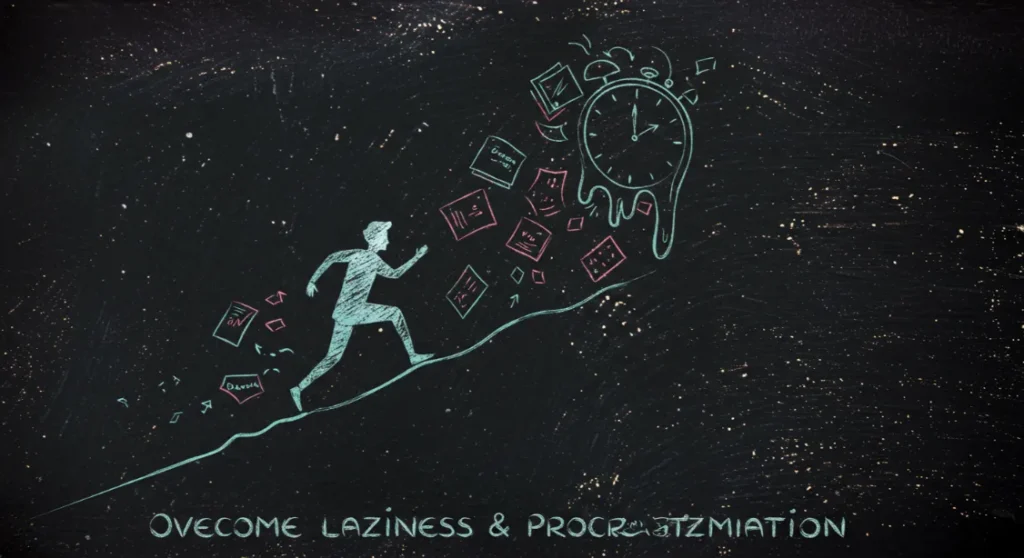Ever found yourself scrolling through social media when you should be tackling that important project? You’re not alone. A staggering 95% of people admit to procrastinating regularly, with 20% considering themselves chronic procrastinators. Procrastination isn’t just about poor time management—it’s a complex psychological dance between our emotions, beliefs, and behaviors.
Let’s dive into the fascinating world of procrastination and time management to help you break free from this productivity-killing cycle and reclaim your time.
Key Takeaways
- Procrastination is an emotional regulation problem, not just poor time management
- Creating a distraction-free environment significantly boosts productivity
- The Pomodoro Technique can help break tasks into manageable focus sessions
- Mindfulness practices improve concentration and reduce procrastination tendencies
- Self-compassion is more effective than self-criticism when overcoming procrastination
- Time management systems help create structure and reduce decision fatigue
Regular exercise and proper sleep hygiene are crucial for maintaining focus
Understanding the Psychology of Procrastination
Procrastination isn’t simply laziness—it’s a complex psychological phenomenon with deep emotional roots. As Dr. Tim Pychyl, a leading procrastination researcher, explains: “Procrastination is an emotion regulation problem, not a time management problem.”
When we face tasks that trigger negative emotions like anxiety, boredom, or frustration, our brain seeks a quick escape. This is where the psychology of procrastination comes into play. Our brains are wired to prioritize immediate rewards over long-term benefits, making it challenging to stay on track with goals that don’t offer instant gratification.
Different Procrastination Styles
Not all procrastinators are created equal! Understanding your unique procrastination style can provide valuable insights into how to overcome it:
| Procrastination Style | Description | Common Behaviors |
|---|---|---|
| The Perfectionist | Delays tasks due to fear of imperfection | Overpreparation, constant revision |
| The Dreamer | Has big ideas but struggles with details | Starting many projects, finishing few |
| The Avoider | Puts off tasks to avoid negative emotions | Distracting themselves with other activities |
| The Crisis-Maker | Thrives on last-minute pressure | Waiting until the deadline is imminent |
| The Defier | Resists external expectations or control | Deliberately delaying tasks assigned by others |
Recognizing your procrastination style is the first step toward breaking free from its grip. It’s like having a personalized roadmap to productivity!
Effective Time Management Strategies
Now that we understand the psychology behind procrastination, let’s explore practical time management strategies to help you overcome it.
Create a Distraction-Free Environment
Your environment plays a crucial role in your ability to focus. To stay focused, create a space that screams “productivity.” Start by decluttering your desk—a messy workspace constantly pulls your attention away from the task at hand. Next, tackle those pesky notifications. Put your phone on silent (or better yet, in another room) and close unnecessary browser tabs.
Consider using noise-canceling headphones or playing ambient sounds to drown out distracting background noise. Creating this concentration sanctuary can significantly boost your productivity.
Embrace the Pomodoro Technique
The Pomodoro Technique is a powerful time management method that can help you break free from procrastination. Here’s how it works:
Choose a task
Set a timer for 25 minutes
Work like a focused ninja until the timer rings
Take a 5-minute break
Repeat 4 times, then take a longer 15-30 minute break
This technique is like interval training for your brain. It helps you focus on one task at a time, avoiding the productivity-killing trap of multitasking. By breaking your work into manageable chunks, you make it less intimidating and more approachable.
Prioritize Tasks Effectively

Not all tasks are created equal. Learning to prioritize tasks is essential for effective time management. Try using the Eisenhower Matrix to categorize your tasks based on their urgency and importance:
Urgent and Important: Do these tasks immediately
Important but Not Urgent: Schedule time for these tasks
Urgent but Not Important: Delegate these tasks if possible
Neither Urgent nor Important: Eliminate these tasks
This framework helps you focus on what truly matters and get more done in less time.
The Mindfulness Approach to Productivity
Mindfulness isn’t just a buzzword—it’s a powerful tool for enhancing focus and reducing procrastination. A recent study found that employees who practiced mindfulness for productivity for just 10 minutes a day increased their productivity by a staggering 22%!
Mindful Meditation
This classic mindfulness technique can significantly improve your ability to focus. Find a quiet spot, sit comfortably, and focus on your breath for a few minutes. When your mind wanders (and it will), gently bring it back to your breath. Regular practice strengthens your attention muscles, making it easier to regain concentration when distractions arise.
Body Scan Technique
The body scan technique involves mentally scanning your body from head to toe, noticing any areas of tension or discomfort. By becoming more aware of your body, you can release physical tension that often accompanies mental stress. This increased body awareness leads to better concentration and reduced procrastination.
Managing Stress for Better Focus

Stress is like kryptonite for concentration. When you’re stressed, your mind is too busy worrying about potential threats to focus on the task at hand. Learning to manage work stress effectively can significantly improve your ability to concentrate.
Understanding the science of stress can help you develop targeted strategies to combat its negative effects. Try incorporating these stress-busting techniques into your routine:
Deep breathing exercises
Progressive muscle relaxation
Regular meditation sessions
Physical activity
Adequate sleep
By keeping stress in check, you’ll find it easier to maintain focus and tackle challenges head-on.
Breaking Tasks into Manageable Chunks
Large tasks can be overwhelming, often leading to procrastination. Try the “Swiss cheese” method: poke small holes in the task by breaking it into tiny, manageable chunks. This approach can help you overcome the initial resistance to starting.
The chunking method is particularly effective for complex projects. By dividing your work into smaller, more digestible pieces, you make it less intimidating and more approachable. Each completed chunk gives you a sense of accomplishment, building momentum to tackle the next piece.
The Power of Routine and Habits

Creating a structured routine that includes dedicated work time can help bypass the decision-making process that often leads to procrastination. When you don’t have to decide whether to work on something, you eliminate a major procrastination trigger.
Consider habit stacking to integrate productive behaviors into your existing routine. For example, “After I pour my morning coffee, I will work on my most important task for 25 minutes.” This technique leverages existing habits to build new, productive ones.
Physical Well-being and Productivity
Your physical well-being has a profound impact on your ability to focus and manage time effectively. Don’t underestimate the power of these fundamental aspects:
Exercise for Mental Clarity
Physical activity increases blood flow to your brain, boosting your ability to focus and concentrate. Exercise and productivity go hand in hand. You don’t need to run a marathon to reap the benefits—even a 10-minute yoga session or a brisk walk around the block can make a significant difference.
Sleep: Your Brain’s Reset Button
Quality sleep is like a reset button for your brain, helping you maintain focus throughout the day. Aim for 7-9 hours of sleep per night and establish a consistent sleep schedule. Sleep for productivity isn’t a luxury—it’s a necessity for peak performance.
Nutrition for Brain Power
What you eat affects how well your brain functions. Focus on brain-friendly foods like blueberries, fatty fish, nuts, and seeds. Don’t forget to stay hydrated! Even mild dehydration can impact your ability to concentrate and make decisions.
Overcoming Perfectionism

For many, procrastination is a shield against potential failure or criticism. If we never start, we can’t fail, right? This perfectionist mindset can paralyze us into inaction.
Practice self-compassion instead of self-criticism. Research shows that treating yourself with kindness is far more effective than beating yourself up for procrastinating. Remember, the goal isn’t perfection—it’s progress.
Taking Control of Your Day

To truly master time management and overcome procrastination, you need to take control of your day. This means being proactive rather than reactive with your time.
Start each day with a clear plan. Identify your most important tasks and tackle them during your peak energy hours. Protect your time by setting boundaries and learning to say no to commitments that will overextend you.
Remember, effective time management isn’t about squeezing more activities into your day—it’s about focusing on what truly matters and eliminating or delegating the rest.
Conclusion: Your Journey to Productivity Mastery
Congratulations! You’ve just taken a giant leap toward understanding and overcoming procrastination through effective time management. Remember, change doesn’t happen overnight. Be patient with yourself as you implement these strategies.
By identifying your procrastination habits, understanding the emotions behind them, and using specific time management techniques, you can boost your productivity and reclaim your time. The journey to becoming a productivity master starts with a single step—and you’ve already taken it by reading this article.
So, what are you waiting for? There’s no time like the present to start your journey toward a procrastination-free life. Your future self will thank you!